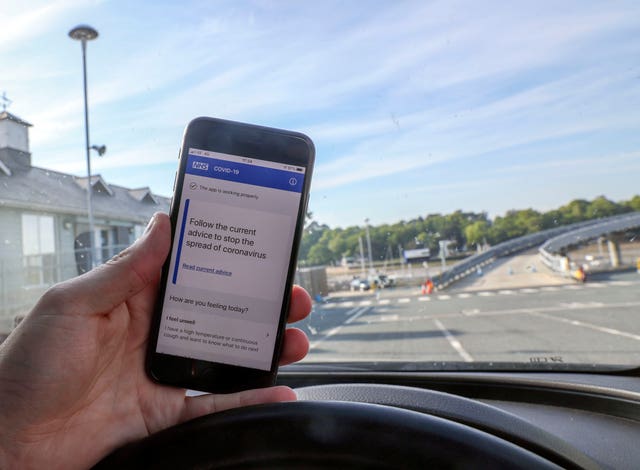Covid-19 contact tracing app: Key questions answered about new trial
What is different about the Government’s second attempt at a contact tracing app for coronavirus?

A contact tracing app for England entered a second trial phase on Thursday using Apple and Google-led technology.
The system is pitched as a possible support tool to the test and trace effort, although several countries already have a working app in place.
So what is different about the Government’s second attempt at a contact tracing app for coronavirus, and will it ever get a national roll-out?
– What is the contact tracing app?
The purpose of the NHS Test and Trace app is to keep an anonymous log of people we come into contact with in public places, particularly those we do not know, such as someone on a bus, as it is too difficult to track down strangers.
It uses Bluetooth technology to note down an anonymous ID of those within two metres of you for 15 minutes who are also using the app, which will send an alert to you if they later test positive for Covid-19 – or vice versa.
– How does the app work?
Any information is stored on your phone and not a central database, the NHS will only become aware of you if you tell the app of symptoms and decide to order a test.
On setup, the app will ask for permission to use Bluetooth in the background – which the app relies on to work – and the ability to send and receive notifications, needed to let you and others know of any positive contacts.
You need to enter the first part of your postcode so that localised flares can be reported, displayed at the top of the app with a risk level grading.
The Government says the app does not take any personal data from the user and does not use GPS to track your location, with the app only able to store data for 14 days after it has been recorded, or it can be deleted by the user at any time.
Those who think they have a coronavirus symptom can tell the app, along with a date for when the symptom first started. If at least one of the three key symptoms is selected, you will be told to self-isolate by the app and a timer will appear based on when you said they started.
You will also be advised to have a Covid-19 test, which will redirect to the Government website.
Results will be sent back in the usual way – email and text – as well as through the app, and if you do test positive, those who have been in close proximity will be sent an alert with advice on also self-isolating.
The process will not be able to name you.
A check-in feature has also be added, allowing people to scan QR codes using their smartphone’s camera in the app, whenever they go to a public venue.
– Who will trial it first?
The Isle of Wight will be first to try the new app from Thursday, as well as NHS volunteer responders across England.
From next week, it will also be made available to residents in Newham in London for testing, although an exact date has not been given yet.
Participants will receive an invitation code to access the app.
– Wait, haven’t we been here before?
Yes, the first test app test was also carried out on the Isle of Wight, but issues with accuracy and concerns about privacy forced officials to rethink its approach entirely, adopting an Apple and Google-led system instead of NHSX developing the technology entirely on its own.
– Why Newham?
Newham has been selected to be part of testing this time around because of its diverse population, with communities which may be more at risk to the virus.
The east London borough was also chosen based on the capital’s greater use of public transport, where the virus is susceptible to greater spread.
– What happens when you get an alert?

If you receive an alert from the app, you will be expected to self-isolate, but given the anonymous nature of the app there will not be any way to identify you and ensure you follow the advice.
– What about those without a smartphone?
Human contact tracing will remain vital to the test and trace effort, with the app only acting as a support tool.
– Will it use up battery?
Officials say battery consumption is about 2% to 3% a day on average.
– Will it be available in multiple languages?
The first release of the app will only be available in English, but it is hoped it will be made available in other languages at some stage.
These include Welsh, Urdu, Bengali, Punjabi and Gujarati.
– So when will it launch properly?
Officials have not revealed a timetable for when they hope to make the app available across England.




